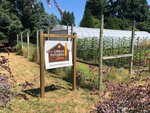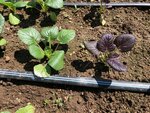


The last of the lettuce has gone to seed and turned bitter in our hot, sunny weather. Only the chickens like it now. The garlic has also been harvested, leaving more bare and idle ground.
Summer is speeding past, and we’ve seen the last sunset past 9 PM.
But the garden has a second season, and it’s just begun. All the space vacated by lettuce, garlic and other early-maturing (or utterly failed) crops is now available to host vegetables we can eat late into the fall.
If a garden department, farmers market or nursery has its wits about it, it will offer started plants of cabbage, broccoli, chard, kale, and various other leafy greens now. They’ll also have lettuce starts for optimists who have shady places and good watering habits.
TJ Johnson, the proprietor of Urban Futures Farm, adds pac choi, tatsoi, fennel and scallions to the list of started plants to get in the ground now. He is also planting napa cabbage, the variety common in Korean kimchi and other Asian dishes. It has lighter, distinctively crinkled leaves, an elongated, upright head, and a slightly more delicate flavor than round cabbage.
I just planted starts of red cabbage from the wide selection of started vegetable plants at Eastside Farm and Garden. It grows into a plant that looks like a supersized rosebud.
Pac choi (sometimes spelled bok choy) is an Asian vegetable that vaguely resembles celery but has a more delicate taste and texture.
Tatsoi is a lettuce substitute that Johnson says is more heat tolerant. It’s also lovely to look at, with layers of rounded leaves arranged as symmetrically as the petals of a dahlia.
His final addition to the fall planting list is radicchio, a bitter, spicy Italian-origin variant of chicory. It’s great to look at: bright white base, bright red leaves. Its bitterness is said to be mellowed when it is grilled or roasted. It’s one of those vegetables that people either love or hate. (If you just want some color contrast in a green salad, red cabbage is a milder substitute.)
Johnson is also planting seeds of radishes and turnips. It’s probably worth taking a chance on planting other crops from seed, too.
I’m betting that the scallions seeds I planted last week will be harvestable all fall and into the winter. The special advantage of growing your own scallions is that you can pull up only the ones you intend to use immediately. This prevents finding a half-bunch of store-bought ones that languished too long in the refrigerator.
But all our choices of what to plant and when come with some risk. We don’t know what the weather has in store for us in the coming months. So far, we’ve escaped the deadly extreme heat, smoke, and flash flooding that has afflicted people in the U. S. and around the world.
We are lucky to live where we live; that should be a source of gratitude. We can also indulge a localized optimism: Our Puget Sound bioregion appeared on a map in a recent documentary pointing to reasonably safe places to live as climate change intensifies. We are certainly not immune to its effects, but at least for now, we’re not in the direct path of disaster.
Maybe the next few months will be good growing weather. It would be a shame to miss it.
I’d say we have pretty good odds of harvesting fresh garden produce until Christmas. So let’s roll the dice. A package of seeds or some sprouted plants are very small investments, with a potentially tasty and welcome payoff on a short, dark, rainy day.
Jill Severn writes from her home in Olympia, where she grows vegetables, flowers, and a small flock of chickens. She loves conversation among gardeners. Start one by emailing her at jill@theJOLTnews.com
1 comment on this item Please log in to comment by clicking here
Terrilovesanimals
Thank you! I loved having a large garden. So good for not only the food but for good exercise! I raised enough for my extended family and to freeze for the whole winter.
Monday, July 24, 2023 Report this